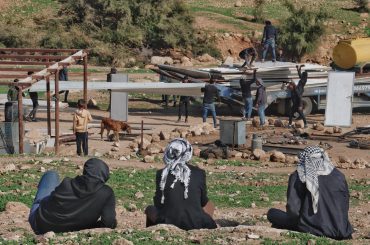Israeli military checkpoints and barriers around the West Bank and Gaza doubtless restrict the flow of goods and labor to farms and businesses and serve to choke off the fledgling $14.7bn Palestinian economy.
This week, the United Nations attempted to put a figure on exactly how much the occupation was costing Palestinian officials. The number it arrived at — an estimated $48bn between 2000 and 2017 — was larger than many folks expected.
According to Mahmoud Elkhafif, from the UN’s Geneva-based trade body, UNCTAD, the losses were roughly three times the size of the entire Palestinian economy in 2017, and easily enough to pay off Ramallah’s budget deficit.
“This is not trivial money,” Elkhafif told Mondoweiss among a small group of journalists in New York on Monday.
“This could turn the economy from an economy of budget deficit to an economy of budget surplus.”
UNCTAD counted money that should have been made available to Palestinian officials under the terms of the so-called Paris Protocol, part of the Oslo Accords that were inked by Israel and the Palestine Liberation Organization in the 1990s.
In the 18-year period, UN economists found that $6.6bn had “leaked” to Israel, including tax revenue and other monies that were collected by Israel and were supposed to be transferred to the Palestinian Authority.
As an example, Elkhafif described the half a million Palestinians who buy Israeli mobile phone SIM cards, as no such Palestinian network exists, starving Palestinian officials of the chance to levy taxes on their own people.
Another $28.2bn was lost in interest payments on loans that were taken out by Palestinian officials to cover their budget.
Additional losses came from “Area C” of the West Bank, which comprises 60 percent of the Palestinian territory and where Israeli-settlement-building and security checks stop Palestinians from making use of their lands.
Losses to Palestinian coffers have snowballed these past two decades. They amounted to $565.5 million in 2000 and grew to $1.9-billion in 2017, the most recent year for which data were available.
Elkhafif’s 60-page report, The Economic Costs of the Israeli Occupation for the Palestinian People: Cumulative Fiscal Costs, will be discussed by the 193-nation UN General Assembly on Tuesday.
Life for ordinary Palestinians would have been much easier had officials been able to spend the missing $48 billion, said Elkhafif. To begin with, Ramallah could have increased development spending tenfold.
Injecting cash back into the Palestinian economy would have generated some 11,000 jobs each year. Currently, 27 percent of Palestinians are jobless, though this climbs to as high as 44 percent in Gaza.
“The impact is tremendous,” said Elkhafif. “This would have reduced unemployment rates by about 5 percent.”
Researchers called the estimated losses “partial and conservative”, saying the real figures could be higher still.
Elkhafif urged Israeli and Palestinian officials to return to the negotiation table to come up with a “fundamental change in many working arrangements” that make it easier for Palestinian officials to collect revenue from businesses that operate more freely.
Israel’s mission to the world body did not immediately respond to a request for comment from Mondoweiss.
The report comes amid growing concerns about widespread poverty across the Palestinian territories, while opportunities for brokering the creation of an independent Palestinian state with the Israelis appear ever-more remote.
In a landmark 2013 study, the World Bank found that Israel’s occupation of Area C of the West Bank was costing the Palestinian economy some $3.4bn each year, or 35 percent of the value of all goods and services traded in the territories.



“This week, the United Nations attempted to put a figure on exactly how much the occupation was costing Palestinian officials. The number it arrived at — an estimated $48bn between 2000 and 2017 — was larger than many folks expected.
“According to Mahmoud Elkhafif, from the UN’s Geneva-based trade body, UNCTAD, the losses were roughly three times the size of the entire Palestinian economy in 2017, and easily enough to pay off Ramallah’s budget deficit.”
“This could turn the economy from an economy of budget deficit to an economy of budget surplus.”
“In the 18-year period, UN economists found that $6.6bn had ‘leaked’ to Israel, including tax revenue and other monies that were collected by Israel and were supposed to be transferred to the Palestinian Authority.”
For over 71 years the indigenous Palestinians have suffered under the racist, fascistic boot of Zionist Jews of foreign origin who have brutally dispossessed, occupied, imprisoned, tortured and expelled them while destroying their homes, fruit and olive groves and depriving them of water. Surely, it’s no surprise that Palestinians have largely been driven into poverty.
Meanwhile, excluding the hundreds of $millions in tax deductible funds provided by various U.S. Zionist organizations and individuals, American tax payers have provided “Israel” with now well over 134.7 $billion in aid since 1948 (Congressional Research Service, U.S. Foreign aid to Israel, Jeremy M. Sharpe, Specialist in Middle East Affairs, April 10, 2018.)
Here’s just one recent example of Zionists’ inhumanity aimed directly at the Palestinian economy:
https://www.haaretz.com/israel-news/.premium-west-bank-olive-harvest-marred-by-50-surge-in-thefts-and-violence-un-report-says-1.8216876
“West Bank Olive Harvest Marred by 50% Surge in Thefts, Vandalism and Violence, UN Report Says” Haaretz, Dec. 4/19, by Hagar Shezaf
“Forty-seven incidents of violence toward Palestinians and their property took place over the past three months Israel Police closed most cases because perpetrators were not identified”
EXCERPT:
“The number of incidents of interference in the Palestinian olive harvest in the West Bank this year has increased by 50 percent compared to 2018, the United Nations Office for the Coordination of Humanitarian Affairs reported.
“Every year the fall olive harvest is marked by an upsurge in violence toward Palestinians and their property, including claims of the theft of olives and of harvesting equipment. Access to some of the olive groves in the West Bank, particularly near Jewish settlements, requires advance coordination with the Israeli army. The list of sites requiring such permission is revised every year and some sites are declared off limits in advance or in the course of the harvest.
“There were 47 incidents reported in the course of this year’s harvest season — between September and November — including nine involving violence toward Palestinians, 27 involving the theft of equipment or of olives that had been picked before the owners of the trees harvested them and 11 cases of damage to a total of 437 trees, the UN agency, the OCHA, reported. The figures don’t include 30 trees in the village of A-Sawiya that were vandalized last Friday.
“Most of the incidents occurred in the vicinity of Nablus and Ramallah, and the data indicate an increase in olive thefts and assaults compared to last year.”
Whinging about alleged economic losses under occupation whilst refusing the economic benefits of the Kushner plan. Hypocrisy galore.
So he said. So what?
There is no independent Palestinian economy. The Palestinian economy depends on Israel. Israel owes nothing to the PA, the PA owes money to the Israeli government. The PA, for example, must pay for the electricity they consume from Israel, including the electricity in Gaza. But the PA does not pay for electricity, and Israel continues to supply them. Israel Gives Water to the PA & Gaza although Hamas Intends to launch rockets into water sources and electricity turbines in Ashkelon.
So, do you have any more jokes?